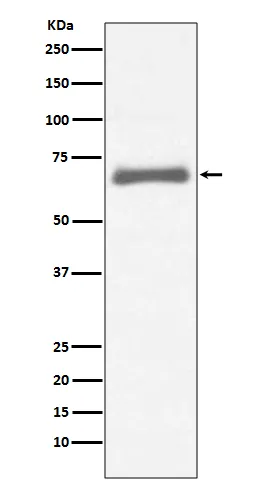
Size:100μL Price:$230
Size:200μL Price:$380
Application:WB,IHC,IP,IF-P
Reactivity:Human
Conjugate:Unconjugated
Optional conjugates: Biotin, FITC (free of charge). See other 26 conjugates.
Gene Name:AFP
Summary
| Production Name | AFP (1J18) Rabbit Monoclonal Antibody |
| Description | Recombinant rabbit monoclonal antibody |
| Host | Rabbit |
| Application | WB,IHC,IP,IF-P |
| Reactivity | Human |
Performance
| Conjugation | Unconjugated |
| Modification | Unmodified |
| Isotype | IgG |
| Clonality | Monoclonal |
| Form | Liquid |
| Storage | Store at 4°C short term. Aliquot and store at -20°C long term. Avoid freeze/thaw cycles. |
| Buffer | Rabbit IgG in phosphate buffered saline , pH 7.4, 150mM NaCl, 0.02% New type preservative N and 50% glycerol. Store at +4°C short term. Store at -20°C long term. Avoid freeze / thaw cycle. |
| Purification | Affinity purification |
Immunogen
| Gene Name | AFP |
| Alternative Names | Alpha fetoglobulin; Alpha fetoprotein precursor; FETA; HPAFP; |
| Gene ID | 174 |
| SwissProt ID | P02771 |
Application
| Dilution Ratio | WB 1:500-1:2000,IHC 1:50-1:200,IP 1:20-1:50,IF-P 1:50-1:200 |
| Molecular Weight | 69kDa |
Background
Alpha-fetoprotein (AFP) is a 65 kDa glycoprotein found in the mammalian fetal liver, yolk sac, and GI tract. In normal adult cells, p53 binds to the repressor region of the AFP gene, thereby blocking transcription. Mutations in both p53 and β-catenin are associated with aberrant expression of AFP. Research studies have shown that elevated serum AFP levels are predictive of hepatocellular carcinoma . Binds copper, nickel, and fatty acids as well as, and bilirubin less well than, serum albumin. Only a small percentage (less than 2%) of the human AFP shows estrogen-binding properties.
Research Area
Cancer
